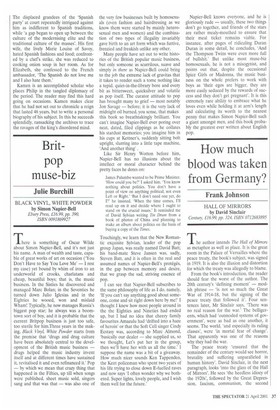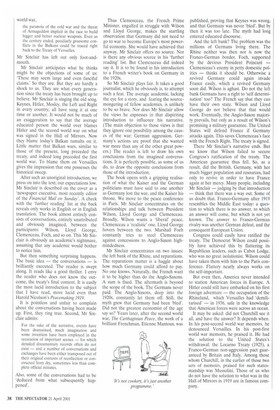How much blood was taken from Germany?
Frank Johnson
HALL OF MIRRORS by David Sinclair Century, £16.99, pp. 324, ISBN 0712683895 The author intends The Hall of Mirrors as metaphor as well as place. It is the great room in the Palace of Versailles where the peace treaty, the book's subject, was signed in 1919. It is also the illusion and distortion for which the treaty was allegedly to blame.
From the book's introduction, the reader should fear the worst of the author. The 20th century's 'defining moment' — modish phrase — 'is not so much the Great War of 1914-18, but the signing of the peace treaty that followed it'. Four sentences later, Mr Sinclair says, 'There was no real reason for the war.' The belligerents, which had 'outmoded systems of government', were as bad as one another, it seems. The world, 'and especially its ruling classes', were 'in mortal fear of change'. That apparently was one of the reasons why they had the war.
The peace treaty 'ensured that the remainder of the century would see horror, brutality and suffering unparalleled in human history'. David Sinclair, in the next paragraph, looks 'into the glass of the Hall of Mirrors'. He sees 'the heedless idiocy of the 1920s', followed by the Great Depression, fascism, communism, the second
the paranoia of the cold war and the threat of Armageddon implicit in the race to build bigger and better nuclear weapons. Even as the century ended, peculiarly gruesome conflicts in the Balkans could be traced right back to the Treaty of Versailles.
Mr Sinclair has left out only foot-andmouth.
Mr Sinclair anticipates what he thinks might be the objections of some of us: 'These may seem large and even fanciful claims.' So they are. But they are hardly a shock to us. They are what every generation since the treaty has been brought up to believe. Mr Sinclair is singing the old song. Keynes, Hitler, Mosley, the Left and Right in every country; all have sung it at one time or another. It would not be much of an exaggeration to say that the average educated person the world over blames Hitler and the second world war on what was signed in the Hall of Mirrors. Now they blame today's Balkan tumults on it. Little matter that Balkan wars, similar to those of the present, long preceded the treaty, and indeed long preceded the first world war. To blame them on Versailles gives the impression that one possesses the historical sweep.
After such an unoriginal introduction, we press on into the text; our expectations low. Mr Sinclair is described on the cover as a 'newspaper executive, most recently editor of the Financial Mail on Sunday'. A check with the 'further reading' list at the back reveals only works in English or in English translation. The book almost entirely consists of conversations, entirely unattributed and obviously imagined, between the participants: Wilson, Lloyd George, Clemenceau, Foch, and so on. This Mr Sinclair is obviously an academic's nightmare, assuming that any academic would bother to notice him.
But then something surprising happens. The basic idea — the conversations — is brilliantly executed. The reader is swept along. It reads like a good thriller. I envy the reader who does not know the outcome, the treaty's final content. It is easily the most lucid introduction to the subject that I have read, more lucid even than Harold Nicolson's Peacemaking 1919.
It is pointless and unfair to complain about the conversations having been made up. First, they ring true. Second, Mr Sinclair admits:
For the sake of the narrative, events have been dramatised, much imagination and some invention have been employed in the recreation of important scenes — for which detailed documentary records often do not exist — and a number of conversations and exchanges have been either transposed out of their original contexts of recollection or constructed from dry, sometimes less than complete official minutes.
Also, some of the conversations had to be 'deduced from what subsequently happened'. Thus Clemenceau, the French Prime Minister, engulfed in struggle with Wilson and Lloyd George, makes the startling observation that Germany did not need to go to war to become Europe's most powerful economy. She would have achieved that anyway. Mr Sinclair offers no source. Nor is there any obvious source in his 'further reading' list. But Clemenceau did indeed say it. It is to be found in his introduction to a French writer's book on Germany in the 1920s.
So Mr Sinclair plays fair. It takes a good journalist, which he obviously is, to attempt such a feat. The average academic, lacking the eye for a story, and fearing the sourcemongering of fellow academics, is unlikely to be so brave. Nor does Mr Sinclair allow the views he expresses in that dispiriting introduction to influence his narrative. (The main objection to those views is that they ignore one possibility among the causes of the war: German aggression. Germany's actions are proof that she wanted war more than any of the other great powers.) The reader is left to draw his own conclusions from the imagined conversations. It is perfectly possible, as some of us do, to draw the opposite conclusions from those of the introduction.
The book opens with a gripping realisation of what the Kaiser and the German politicians must have said to one another as Germany lost the war, and the Kaiser his throne. We move to the peace conference in Paris, Mr Sinclair concentrates on the relationships and talk between President Wilson, Lloyd George and Clemenceau. Broadly, Wilson wants a 'liberal' peace, Clemenceau a 'realistic' one. Lloyd George hovers between the two. Marshall Foch constantly tries to steel Clemenceau against concessions to Anglo-Saxon highmindedness.
Mr Sinclair concentrates on two issues: the left bank of the Rhine, and reparations. The reparations matter is a haggle about how much Germany could afford to pay. No one knows. Naturally, the French want it to be higher than do the Anglo-Saxons. A sum is fixed. The aftermath is beyond the scope of the book. The Germans never paid. The Anglo-Saxons, deep into the 1920s, constantly let them off. Still, the myth grew that Germany had been 'bled'. Did not the greatest economist of the age say so? Years later, after the second world war, The Carthaginian Peace, the work of a brilliant Frenchman, Etienne Mantoux, was
published, proving that Keynes was wrong, and that Germany was never 'bled'. But by then it was too late. The myth had long entered educated discourse.
And the left bank? The problem was the millions of Germans living there. The Rhine neither was then nor is now the Franco-German border. Foch, supported by the devious President Poincare — Clemenceau's enemy in petty domestic politics — thinks it should be. Otherwise a revived Germany could again invade France easily, which a revived Germany soon did. Wilson is aghast. Do not the left bank Germans have a right to 'self determination' too? The French say that they can have their own state. Wilson and Lloyd George do not believe that that would work. Eventually, the Anglo-Saxon majority prevails, but only as a result of Wilson's promising a military guarantee. The United States will defend France if Germany attacks again. This saves Clemenceau's face with the French Right. The treaty is signed.
There Mr Sinclair's narrative ends. But we know that Wilson failed to secure Congress's ratification of the treaty. The American guarantee thus fell. So, as a result, did the British. Germany, with her much bigger population and resources, had only to revive in order to have France again at her mercy. Many people. including Mr Sinclair — judging by that introduction — think that there was a way out. Some of us doubt that. Franco-Germany after 1919 resembles the Middle East today: a question to which there is no answer, to which an answer will come, but which is not yet known. The answer to Franco-German rivalry was another German defeat, and the consequent European Union.
Congress could easily have ratified the treaty. The Democrat Wilson could possibly have achieved this by flattering its Republican leaders, such as Cabot Lodge, who was no great isolationist. Wilson could have taken them with him to the Paris conference. Flattery nearly always works on the self-important.
But even then, America never intended to station American forces in Europe. A Hitler could still have embarked on his first foreign adventure — the occupation of the Rhineland, which Versailles had 'demilitarised' — in 1936, safe in the knowledge that American forces were across an ocean.
It may be asked: did not Churchill see it all, and have the answer? It depends when. In his post-second world war memoirs, he denounced Versailles. In his post-first world war memoirs, he praised it. He had the solution to the United States's withdrawal: the Locarno Treaty (1925), a Franco-German non-aggression pact guaranteed by Britain and Italy. Among those whom Churchill, in the earlier of those two sets of memoirs, praised for such statesmanship was Mussolini. Those of us who do not have the solution to what was in the Hall of Mirrors in 1919 are in famous company.



































































 Previous page
Previous page